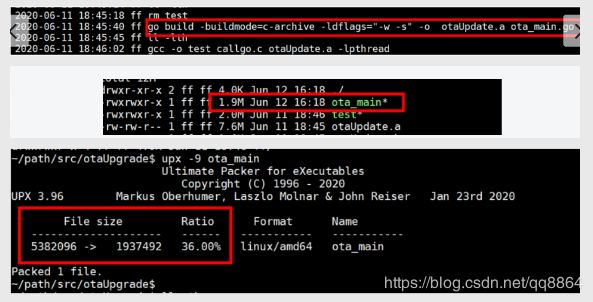c语言调用go封装的动态库步骤及减小体积包的方法
嫌go编译后的动态库或静态库供c代码或嵌入式终端使用,体积太大?upx工具解决这一问题。
upx真是一个神器,再也不用担心和抱怨go在嵌入式linux应用上体积包大了。
1.go build添加 -ldflags="-w -s" 会去除 DWARF调试信息、符号信息
```
go build -ldflags="-w -s" ota_main.go
```
```
go build -buildmode=c-shared -o test.so
```
-buildmode=c-shared requires exactly one main package
注意:生成C可调用的so时,Go源代码需要以下几个注意。
必须导入 “C” 包
必须在可外部调用的函数前加上 【//export 函数名】的注释
必须是main包,切含有main函数,main函数可以什么都不干
2.优化方案 第二步:压缩优化
执行命令:
```
upx.exe -9 *.exe
```
upx-3.96-amd64_linux.tar.xz
打开文件夹
upx工具 解压后放到 /usr/bin目录下就可以直接使用了
编译为c动态库用的什么指令?
增加一个属性:-buildmode=c-archive
-buildmode=c-shared 这个是动态库
举例:一个go文件编译初始值:7M
去调试信息编译:5.2M
upx处理后:1.9M
go调用c代码一例:
package main
/*
#include
#include
void c_print(char *str) {
printf("%s\n", str);
}
*/
import "C" //import “C” 必须单起一行,并且紧跟在注释行之后
import "unsafe"
func main() {
s := "Hello Cgo"
cs := C.CString(s)//字符串映射
C.c_print(cs)//调用C函数
defer C.free(unsafe.Pointer(cs))//释放内存
} 1、go代码中的C代码,需要用注释包裹,块注释和行注释均可。
其次import “C”是必须的,并且和上面的C代码之间不能用空行分割,必须紧密相连
如果执行go run **时出现
# command-line-arguments
could not determine kind of name for xxx
那么就需要考虑 是不是improt “C”和上面的C代码没有紧挨着导致了
2、import “C” 并没有导入一个名为C的包,这里的import “C”类似于告诉Cgo将之前注释块中的C代码生成一段具有包装性质的Go代码
3、访问C语言中的函数需要在前面加上C.前缀,如C.Cstring C.go_print C.free
4、对于C语中的原生类型,Cgo都有对应的Go语言中的类型 如go代码中C.int,C.char对应于c语言中的int,signed char,而C语言中void*指针在Go语言中用特殊的unsafe.Pointer(cs)来对应。
而Go语言中的string类型,在C语言中用字符数组来表示,二者的转换需要通过go提供的一系列函数来完成:
C.Cstring : 转换go的字符串为C字符串,C中的字符串是使用malloc分配的,所以需要调用C.free来释放内存。
C.Gostring : 转换C字符串为go字符串。
C.GoStringN : 转换一定长度的C字符串为go字符串。
typedef signed char GoInt8;//对应go代码中的int8类型
typedef struct { const char *p; GoInt n; } GoString;//对应go中的字符串
需要注意的是每次转换都会导致一次内存复制,所以字符串的内容是不可以修改的。
5、利用defer C.free 和unsafe.Pointer显示释放调用C.Cstring所生成的内存块。
go代码中的main函数是必须的,有main函数才能让cgo编译器去把包编译成c的库。
import “C”是必须的,如果没有import “C” 将只会build出一个.a文件,而缺少.h文件。
//exoort 函数名 这里的函数名要和下面的的go函数名一致,并且下面一行即为要导出的go函数。
举例:
package main
import "fmt"
import "C"
//export test
func test() {
fmt.Printf("hello go test0\n")
}
//export test1
func test1(a, b int) int {
fmt.Printf("hello go test1\n")
return 0
}
//export test2
func test2(a, b string) (int, error) {
fmt.Printf("hello go test2,a=%s,b=%s\n", a, b)
return 0, nil
}
//export test3
func test3(a, b []byte) {
fmt.Printf("hello go test3\n")
fmt.Printf("%#v,%#v\n", a, b)
}
func main() {
fmt.Printf("hello go,this is main\n")
}
go build -buildmode=c-shared -o test.so
c语言中调用:
#include
#include
#include "test.h"
int main()
{
printf("c test,use go so lib\n");
test();
test1(1,2);
struct test2_return r;
char cvalue[] = "Hello This is a C Application";
int length = strlen(cvalue);
GoString value = {cvalue, length};//go中的字符串类型在c中为GoString
r = test2(value,value);
GoSlice p1,p2;
char a1[5],a2[5];
p1.data = a1;
p1.len =5;
p1.cap = 5;
p2.data = a2;
p2.len =5;
p2.cap = 5;
test3(p1,p2);
return 0;
} test.h头文件如下:
/* Code generated by cmd/cgo; DO NOT EDIT. */
/* package test */
#line 1 "cgo-builtin-prolog"
#include /* for ptrdiff_t below */
#ifndef GO_CGO_EXPORT_PROLOGUE_H
#define GO_CGO_EXPORT_PROLOGUE_H
typedef struct { const char *p; ptrdiff_t n; } _GoString_;
#endif
/* Start of preamble from import "C" comments. */
/* End of preamble from import "C" comments. */
/* Start of boilerplate cgo prologue. */
#line 1 "cgo-gcc-export-header-prolog"
#ifndef GO_CGO_PROLOGUE_H
#define GO_CGO_PROLOGUE_H
typedef signed char GoInt8;
typedef unsigned char GoUint8;
typedef short GoInt16;
typedef unsigned short GoUint16;
typedef int GoInt32;
typedef unsigned int GoUint32;
typedef long long GoInt64;
typedef unsigned long long GoUint64;
typedef GoInt64 GoInt;
typedef GoUint64 GoUint;
typedef __SIZE_TYPE__ GoUintptr;
typedef float GoFloat32;
typedef double GoFloat64;
typedef float _Complex GoComplex64;
typedef double _Complex GoComplex128;
/*
static assertion to make sure the file is being used on architecture
at least with matching size of GoInt.
*/
typedef char _check_for_64_bit_pointer_matching_GoInt[sizeof(void*)==64/8 ? 1:-1];
typedef _GoString_ GoString;
typedef void *GoMap;
typedef void *GoChan;
typedef struct { void *t; void *v; } GoInterface;
typedef struct { void *data; GoInt len; GoInt cap; } GoSlice;
#endif
/* End of boilerplate cgo prologue. */
#ifdef __cplusplus
extern "C" {
#endif
extern void test();
extern GoInt test1(GoInt p0, GoInt p1);
/* Return type for test2 */
struct test2_return {
GoInt r0;
GoInterface r1;
};
extern struct test2_return test2(GoString p0, GoString p1);
extern void test3(GoSlice p0, GoSlice p1);
#ifdef __cplusplus
}
#endif
gcc test.c test.so 生成了a.out
./a.out运行。
Go导出dll如何返回struct等复杂结构?
Go type not supported in export: struct
因为export里不支持Go语言的struct。
正确的写法如:
package main
/*
struct Info {
int x;
};
*/
import "C"
import (
"log"
)
//export Show
func Show() C.struct_Info{
log.Printf("Return: %d", 110)
return C.struct_Info{x:0}
}
func main() {
Show();
}